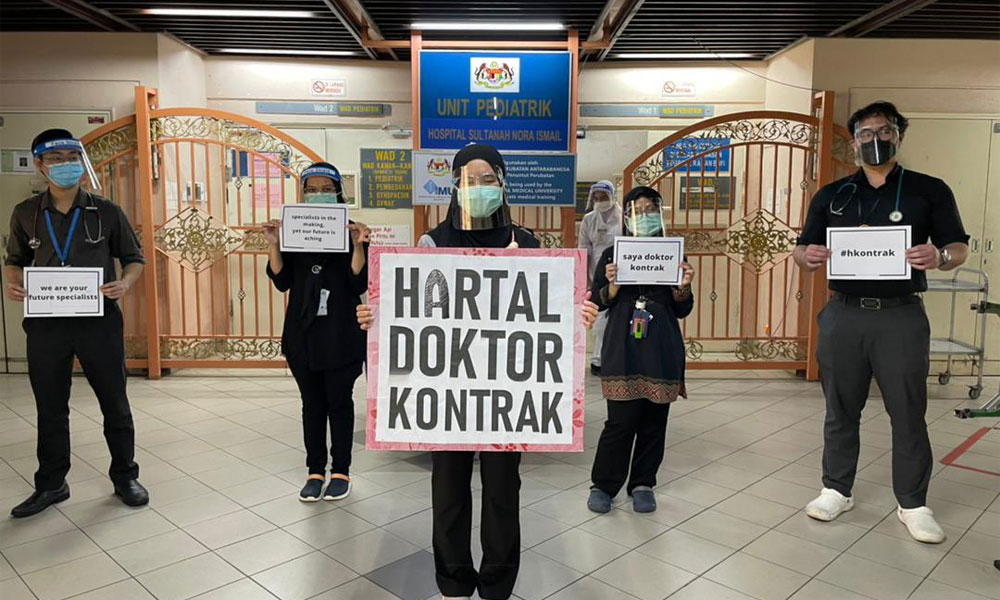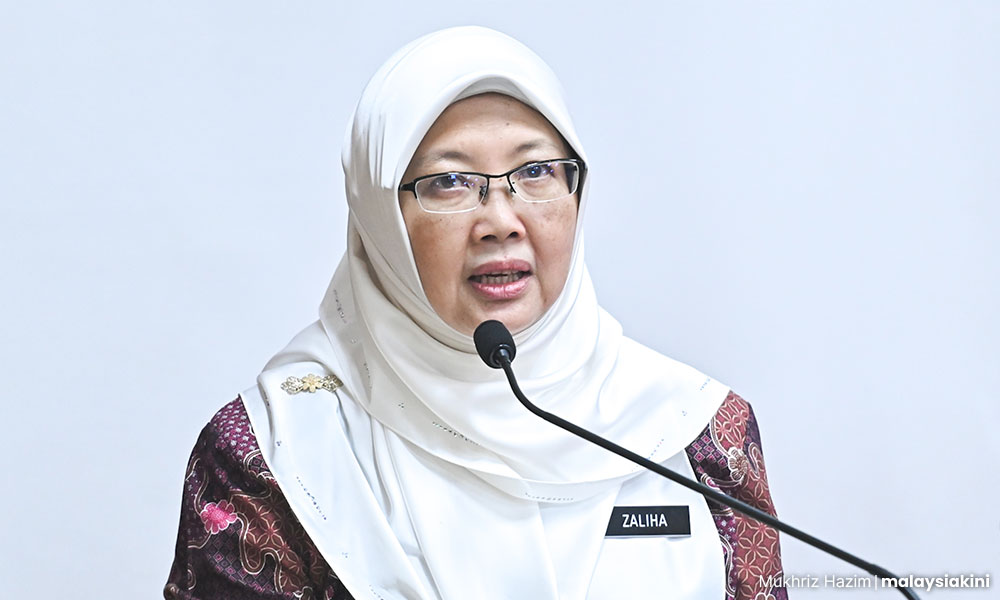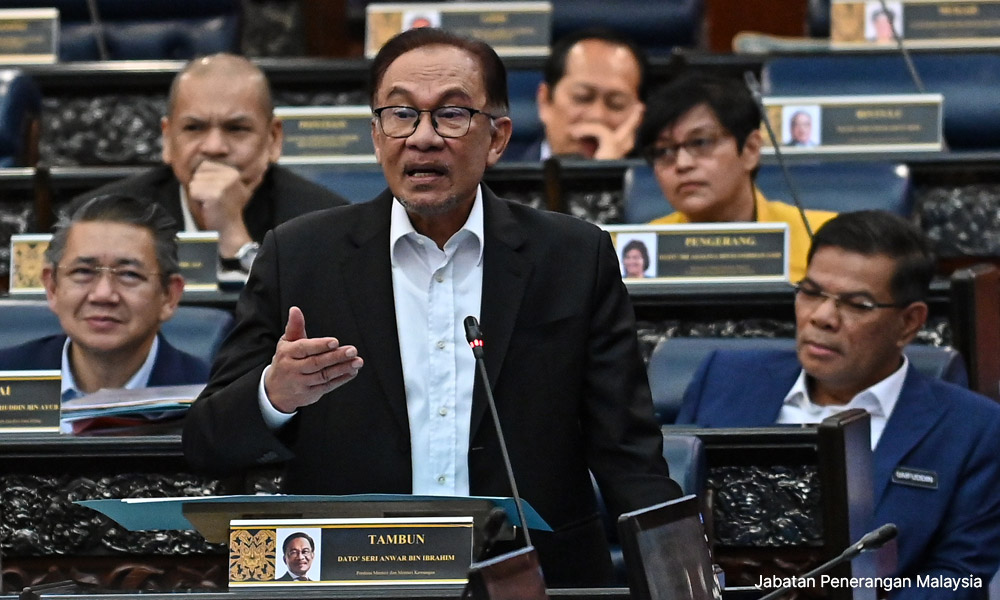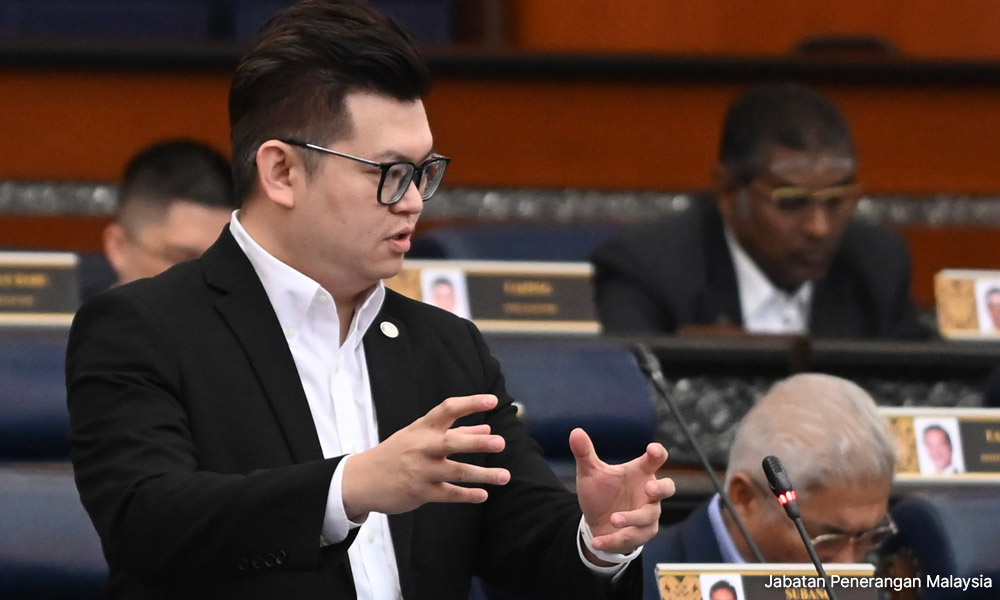KINIGUIDE | Who are the doctors striking and what do they want?
KINIGUIDE | Warnings of a contract doctor strike that could disrupt the healthcare system have hit headlines over the past week.
The strike, taking place from April 3 to 5, called on contract doctors to protest by taking medical leave, emergency leave, or by resigning en masse.
In this instalment of KiniGuide, we take a quick look at what this strike is about.
Who is behind the contract doctor strike?
The strike was called for by an anonymous group, “Mogok Doktor Kontrak”, which claims to be a group of contract doctors working in the public healthcare system.
The group issued the call to strike through an Instagram account and, to date, only one “Dr Jamal” has come forward as a spokesperson for the group but it is unclear which health facility he is attached to.
The group told the media they expected at least 10,000 to 12,000 contract doctors to go on strike this week.
Is this the first time contract doctors are protesting?
No, the last major healthcare workers’ strike took place in July 2021, then led by a separate movement - Hartal Doktor Kontrak.
At the time, hundreds of government contract doctors from around 15-20 hospitals carried out mass walkouts. They demanded job security and better career opportunities.

The walkouts occurred after the government at the time, led by Muhyiddin Yassin, offered the doctors an extension of their contracts, stopping short of offering permanent positions.
They were also promised similar perks with permanent doctors.
Responding to the latest call for a strike, the Hartal Doktor Kontrak group said it was not associated with Mogok Doktor Malaysia, nor does it know who the latest strike organisers are.
However, Hartal Doktor Kontrak said it respected the group’s right to protest.
What are Mogok Doktor Kontrak’s demands?
According to their social media postings, Mogok Doktor Kontrak called the strike to demand that all contract doctors be given permanent positions, an increase in basic salary and on-call rates, and for staff shortages to be resolved.
According to their Instagram account, this strike was planned as early as Jan 11 this year. The dates for this week’s protest were officially announced on Feb 23.
This was a day after the town hall session held between Health Minister Dr Zaliha Mustafa and contract doctors, where she pledged to resolve the issues plaguing medical officers in the country.
Mogok Doktor Malaysia took to social media to lament the minister’s lack of “concrete steps” to resolve the issues. The group proceeded with the planning of this week’s strike.
Has the strike been successful?
Malaysiakini reported yesterday that government hospitals in Klang Valley and Malacca were operating as usual despite threats of the strike.
Reports by other media also indicated that public hospitals in Johor, Perak, and Sarawak also had sufficient staff to cater to patients.

Several doctors Malaysiakini spoke to said they were not participating in the organised strike, despite being made aware of it.
One doctor told Malaysiakini many of their peers felt the strike was not beneficial to their cause, adding that the anonymous organiser made the strike “suspicious”.
Mogok Doktor Kontrak called the first day of their strike “a success”.
However, the group appeared to have deactivated its Instagram account earlier today, the second day of its strike.
NST reported a spokesperson for the group claiming hospitals were operating smoothly as there were 30 percent fewer patients, resulting in a sufficient number of personnel despite contract doctors not working that day.
“We have gone through the census books in the emergency departments and labour rooms.. the patient rate was reduced by 30 percent.
“It seems like nothing happened because the crowd has reduced, thus the workforce is adequate to manage the situation,” the spokesperson was quoted as saying.
How has the government responded?
Prime Minister Anwar Ibrahim announced today that 4,300 contract doctors would get permanent jobs this year.
Expanding on this in the Dewan Rakyat today, he said the government expected 12,800 out of the existing 20,330 contract doctors to be absorbed into public service within the next three years.

He said the government has agreed for on-call allowance to be extended to medical officers at six health clinics involved in a pilot project to tackle the overcrowding issue in hospitals.
The government's response has not been all positive.
Upon media reports of the strike, the Health Ministry reminded civil servants they are forbidden from joining “illegal gatherings”.
These were deemed illegal: “active involvement” outside of working hours, leaving the office to observe and join gatherings, and using office equipment to print and distribute fliers related to illegal gatherings.
The Johor Health Department also warned of disciplinary action against contract doctors in the state if they participated in the protest.
Malaysiakini understands that several hospitals have warned their staff against taking medical or emergency leaves for the duration of the protest.
Meanwhile, Health director-general Dr Noor Hisham Abdullah said that unplanned strikes were not the best solution to any problems related to the medical profession and that problems need to be dealt through a more prudent way.
Before the strike, Zaliha told NST government hospitals would be on alert to monitor if the strike would go as planned. She said hospital and clinic operations would proceed as normal.
The government also established a high-level inter-ministerial committee to look into issues related to contract doctors.
Deputy Prime Minister Ahmad Zahid Hamidi asked for the committee to be given time to come up with a solution.
How have other stakeholders responded?
Bandar Kuching MP Kelvin Yii opined yesterday that the substantive demands put forth by the strikers must not be ignored.
He added that he would push the Health Ministry not to take disciplinary action against striking doctors.

Pasir Gudang MP Hassan Abdul Karim appealed to Prime Minister Anwar Ibrahim for immediate intervention to assuage the doctors who are furious at the government.
Some senior doctors also urged the authorities to intervene immediately to prevent contract doctors from going on strike.
What are contract doctors’ woes?
In January, an online poll by health news website CodeBlue found widespread dissatisfaction and anger among government healthcare workers.
An overwhelming 95 percent of 1,652 respondents, comprising both contract and permanent staff, felt that the country’s public healthcare system was in “crisis” while 73 percent were considering quitting.
The survey also revealed that 52 percent said they would participate in a strike if one was organised.
Among other issues raised by a majority of the respondents were being overworked, underpaid, burnt out, and insecure about their career progression.
A contract medical officer earns a basic salary of RM4,000 and does not enjoy the same allowance rates as permanent staff.
As such, some contract doctors have shared how they have to work second jobs or start businesses outside of medicine to make ends meet.

Contract doctors have also lamented how they do not have a pathway to specialisation, with only permanent appointees allowed to take on further studies.
However, last year, contract doctors were made eligible to apply for specialist training under the Hadiah Latihan Persekutuan (HLP) sponsorship and can begin applying for their Master’s degree, Area of Special Interest (AOSI), or PhD.
The pathway to being absorbed as a permanent staff is also unclear, according to the Malaysian Medical Association, which proposed a point system to ensure transparency in the selection for permanent posts.
Why is the government hiring doctors on contract?
The contract system for doctors was introduced in 2016 to address the glut of medical graduates following the mushrooming of private medical colleges and policy changes to accept those from medical schools overseas.
At the time, doctors were offered a five-year term (three years plus two years extension), but the issue has prolonged with most contract doctors not being offered permanent posts.
The ministry earlier said it was unable to offer more permanent posts as they were not allocated for by the Public Services Department (PSD).
However, last week, the minister said they are working out a deal with the PSD to offer more permanent posts, but without pensions, to not increase the government’s pension bill.
Although the new deal will not include a pension, it includes other perks enjoyed by permanent staff such as housing loans, she told the Dewan Negara.
It is unclear if the positions announced by the prime minister today are under the deal.
Is the strike politically motivated?
Suspicions of the striking group’s political affiliation rose after the person handling the Mogok Kontrak Doktor Instagram account said the group would not respond to Malaysiakini and two other news websites because they are owned by “DAP or Pakatan Harapan-linked (political) parties”.

The person claimed Malaysiakini’s articles on the strike were “highly biased” and did not want to entertain the portal’s request for comment when contacted.
However, the group reportedly said they are open to cooperating with any political party that would fight for their rights.
A member of Perikatan Nasional (PN)’s health committee, Dr Aiman Alias, has denied his coalition’s involvement with the strike, saying they merely supported the movement.
He also told Malaysiakini they have tried contacting the striking group to no avail.
PN health committee chairperson and Kuala Langat MP Dr Ahmad Yunus Hairi also voiced support for the movement, urging the government not to punish any civil servants involved in this week’s strike.
RM12.50 / month
- Unlimited access to award-winning journalism
- Comment and share your opinions on all our articles
- Gift interesting stories to your friends
- Tax deductable
